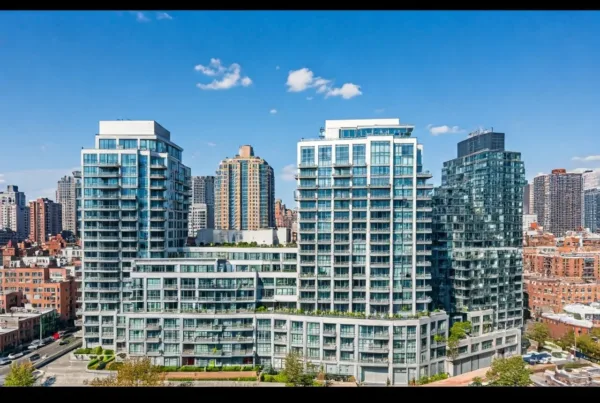Unveiling the intricate dance of paperwork and negotiations in NYC co-op closing. Discover the secrets behind a successful closing!
Table of Contents
Buying or selling a home is a big deal, especially in a vibrant place like New York City. One popular type of housing in NYC is the co-op. The co-op closing process can be different and a bit tricky compared to regular home sales. But don’t worry! In this guide, we’ll break it down so you understand how everything works.
What is a Co-op?
A co-op, short for cooperative, is a type of apartment where residents do not own their individual units. Instead, the entire building is owned by a corporation. When someone buys a co-op apartment, they are actually buying shares in the corporation that owns the building. This makes co-ops different from other types of apartments where people own their specific units. In a co-op, you have a say in how things are run, but you also have to follow the rules set by the co-op board.
Why the Closing Process Matters
The closing process is a crucial step when buying or selling NYC co-op apartments. It’s when everything comes together and the final details are sorted out. Both buyers and sellers need to understand this process to ensure a smooth transaction. If you are a buyer, this process helps you get your new home officially. For sellers, it’s the final step to hand off their property to someone new. Knowing what to expect makes the whole experience less stressful and more straightforward!
Understanding the Co-op Closing Process
The co op closing process in NYC can seem tricky, but it doesn’t have to be! Let’s break it down into easy steps. This process is super important for anyone looking to sell my NYC property or buy one. Knowing what to expect will help you feel ready for each part!
Step 1: Getting Accepted by the Co-op Board
The first step is getting accepted by the co-op board. When you want to buy a co-op apartment, you must fill out an application. This application tells the board about you and why you want to live there. You might need to share things like your job and how much money you make. The board will review everything carefully. If they like what they see, they will give you the thumbs up! Being friendly and polite during this process can help you make a good impression.
Step 2: Signing the Contract
Once you are accepted, it’s time to sign the contract. The contract is an important paper that says both the buyer and seller agree to the sale. It includes details like the price and any special rules for the co-op. Make sure you read everything and ask questions if something seems unclear. It’s a big step, so take your time and understand what you are signing.
Step 3: Preparing for Closing Day
Now that the contract is signed, it’s time to get ready for closing day. Before closing, you need to gather all the necessary documents. This includes things like your financial papers and any forms that say you are allowed to buy the co-op. It’s smart to double-check everything so that you are ready when the day arrives. Being prepared means the day will go smoothly!
Step 4: Closing Day Activities
Finally, it’s closing day! This is when all the magic happens. You’ll meet with the sellers, your lawyer, and sometimes the real estate agent. Everyone will sit at a table and sign important papers. After all the papers are signed, you might get the keys to your new home! It’s a big moment, so get ready to celebrate your new co-op apartment!
Documents Needed to Sell a Co-op
Selling a co-op in NYC has some important steps. One of the most important things to know is the documents to sell my house. These papers help everything go smoothly during the sale. Here are the key documents you will need to collect.
Personal Financial Statement
A personal financial statement is very important when you’re selling your co-op. This document shows your income, assets, and liabilities. It helps the co-op board understand your financial situation. Make sure it includes details about your job, bank accounts, and any loans you have. A clear financial picture will help your application.
Co-op Application
The next important document is the co-op application. This is a set of papers that tells the co-op board about you as a buyer. It usually includes information like your work history, financial details, and personal references. You will need to fill out this application carefully, as it helps the board decide if they will accept the buyer.
Contract of Sale
Now, let’s talk about the contract of sale. This document is like an agreement between you and the buyer. It lists the price of the co-op and any other conditions for the sale. The contract of sale is important because it protects both you and the buyer. Make sure this document is clear and that both sides agree to it.
Personal Letter of Recommendation
Sometimes, a personal letter of recommendation for the co-op board is needed. This letter can come from someone who knows you well, like a family member or a friend. It should highlight your good qualities, like being responsible and friendly. A strong letter can help make a good impression on the board and can be a helpful part of the application process.
Gathering these documents can feel overwhelming, but they are crucial for a successful sale. Each one plays a big role in making sure everything goes well when you sell my NYC property.
Roles of Different People in the Process
In the co op closing process, many people work together to help the buyer and seller complete the sale of an NYC co op apartment. Each person has a special role. Understanding these roles can make the process easier. Let’s look at who is involved and what they do!
Role of the Seller and Buyer
The seller and buyer are the main people in this process. The seller wants to sell their NYC co op apartments, while the buyer wants to purchase one. The seller prepares the apartment and gathers all the necessary documents to sell my house. They also need to share information about the building with the buyer. On the other hand, the buyer will make an offer, do their research, and submit their application to the co-op board. Both need to communicate well to make the process smooth.
Role of the Co-seller
A co-seller is someone who also helps sell the co-op apartment. This person might be a family member or a close friend. The co-seller’s job is to support the primary seller, especially if they have a financial interest in the property. They may need to provide extra documents or share their financial information. Having a co-seller can help reassure the co-op board and make it easier to get accepted!
| Step | Description |
|---|---|
| 1 | Initial Offer: Buyer submits an offer to purchase the co-op apartment. |
| 2 | Acceptance: Seller accepts the offer, and a contract is signed by both parties. |
| 3 | Board Package: Buyer submits a board package with financial documents for approval. |
| 4 | Board Interview: Buyer meets with the co-op board for an interview. |
| 5 | Approval: Co-op board approves the buyer as a new shareholder. |
| 6 | Closing Costs: Buyer pays closing costs, including attorney fees and transfer taxes. |
| 7 | Closing: Buyer and seller sign closing documents and transfer ownership. |
Role of the Real Estate Agent
Many people choose to work with a real estate agent during the process. The real estate agent helps both the seller and buyer throughout the co op closing process. They find the right NYC co op apartments, set up viewings, and help with negotiations. Real estate agents also guide sellers on the best price for their apartments and advise buyers on making fair offers. Their experience can help everyone avoid common mistakes!
Role of the Lawyer
Having a lawyer is super important in this process. Lawyers help by handling all the legal tasks and ensuring everything is done right. They review documents to sell my house, make sure all rules are followed, and protect everyone’s rights. If there are any issues or questions, the lawyer provides answers and solutions. They help keep things legal and clear!
Common Challenges and Solutions
The co op closing process can sometimes feel tricky. Many people face challenges when buying or selling their NYC co op apartments. However, with the right knowledge, you can handle these bumps in the road smoothly.
Financing Issues
One of the most common challenges is financing. Sometimes, people may find it hard to secure enough funds. Whether they are buying or selling, it can cause stress. To manage this, it’s important to talk to a bank or mortgage broker early on. They can help you understand what you can afford. Make sure to prepare all necessary financial documents ahead of time. This will help speed up the process and avoid surprises later.
Document Readiness
An important part of the co op closing process is having all your documents ready. Missing or incorrect documents can delay your closing. A good tip is to make a checklist of all documents needed to sell my house. You can even ask your real estate agent or lawyer for help in gathering everything. Being organized and prepared can make this part much easier!
Board Rejections
Another challenge might be dealing with board rejections. Sometimes, the co-op board might reject an application. This can happen for various reasons, such as financial concerns or the number of applicants. If you face this situation, don’t panic. Find out the specific reasons for the rejection. You can work on addressing these issues before applying again. A personal letter of recommendation for the co op board may also help in future applications. It shows you have support from others!
Delays in Closing
Delays in closing can also happen during the co op closing process. These delays can occur due to many reasons like paperwork issues or scheduling conflicts. To handle this, communicate regularly with everyone involved, including your lawyer and real estate agent. Keeping open lines of communication helps everyone stay informed and can make the process smoother. Remember, staying patient and organized is key!
Conclusion
The co-op closing process is an essential journey for anyone looking to buy or sell NYC co-op apartments. Understanding each step, from applying to the co-op board to finalizing the paperwork, helps make the experience smoother. By knowing what documents to sell my house and the roles of various people, you can move forward confidently.
Throughout this guide, we explored the importance of key documents needed to sell a co-op, including the personal financial statement and the co-op application. There are also moments when challenges can arise, like financing issues or board rejections. However, being prepared can make all the difference.
For both sellers and buyers, knowing the co-op closing process equips you with the tools to face any obstacles that may come your way. With the right information and support, you can navigate this world confidently and successfully. Remember, every step you take is a building block toward securing your new home or selling your property.
Frequently Asked Questions (FAQs)
What is the average time for a co-op closing in NYC?
The average time for a co-op closing in NYC can vary a lot. Typically, it takes about 30 to 60 days from when you sign the contract to when you close. This time can change based on how fast the co-op board processes everything and if there are any delays with documents. Being prepared can help speed things up!
Do I need a lawyer to help with the co-op closing process?
Yes, having a lawyer is really important during the co op closing process. They help you understand all the legal stuff and make sure you follow the rules. A lawyer can review documents and help you avoid any mistakes. This way, everything goes smoothly, and you protect your rights!
Can a co-op board reject my application?
Yes, a co-op board can reject your application. This can happen for different reasons, like not having enough income or not meeting the board’s requirements. If this happens, don’t worry! You can ask the board for feedback and see if there’s anything you can fix to improve your chances next time.
What financial documents are required?
Begin your search and start earning cash back!
When you want to sell my NYC property, you’ll need several important financial documents. These include a personal financial statement, tax returns, and proof of income. Having these documents ready will make the co op closing process easier and show the board that you’re serious about buying or selling.







